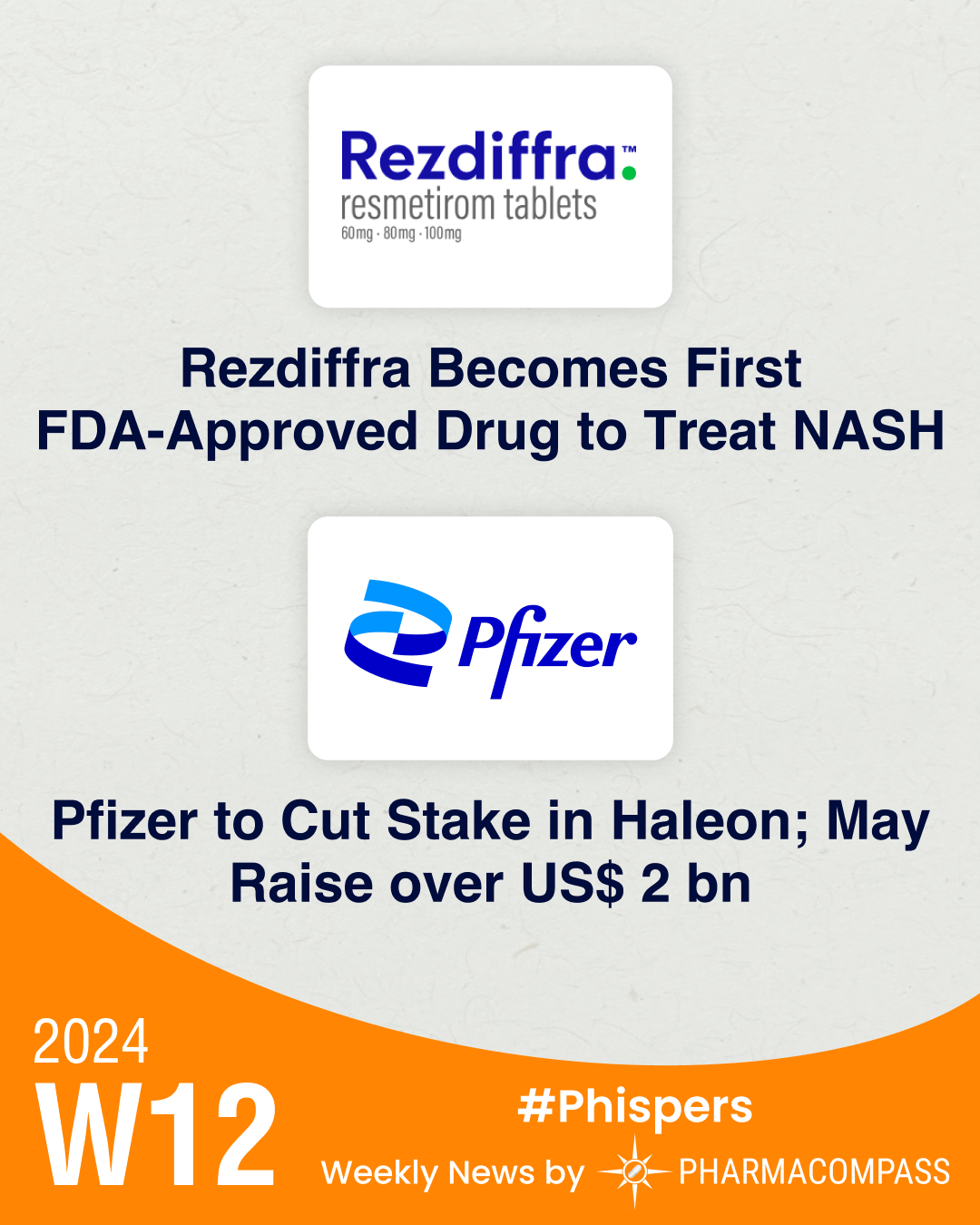
By PharmaCompass
2024-03-21
Impressions: 1,909
It was a week of drug approvals, as the US Food and Drug Administration (FDA) okayed several therapies before the close of the first quarter of 2024.
For quite some time, the drug development field for the liver condition non-alcoholic steatohepatitis (NASH) has been a graveyard for failed programs. This week, the field celebrated a hurrah moment when Madrigal Pharmaceuticals won the race to have the first NASH treatment approved by the FDA.
After nearly 40 years, FDA approved a new therapeutic pathway for hypertension. Idorsia’s Tryvio is a once-daily med for hypertension that is to be used in combination with other BP drugs by people who are not able to adequately control their BP on other drugs.
FDA has also granted the chimeric antigen receptor (CAR) T-cell therapy Breyanzi accelerated approval for two types of hard-to-treat blood cancers and its oncology panel has ruled favorably on Johnson & Johnson’s Carvykti and Bristol Myers Squibb’s Abcema.
Orchard Therapeutics’ Lenmeldy has secured FDA approval to become the first gene therapy in the US for a rare pediatric disorder – metachromatic leukodystrophy (MLD). The agency also approved Optinose’s Xhance —the first medicine to treat chronic sinusitis.
In deals, AstraZeneca bought two companies, shoring up its cancer and rare disease pipelines. The Anglo-Swedish drugmaker first bought France’s Amolyt, which focuses on rare endocrine diseases, for a total of US$ 1.05 billion and then acquired next-generation cancer drugmaker Fusion Pharmaceuticals for around US$ 2 billion. Meanwhile, Pfizer said it intends to cut its stake in Haleon from 32 percent to 24 percent.
Madrigal’s Rezdiffra becomes first FDA-approved drug for liver disease NASH
Madrigal’s oral drug Rezdiffra (resmetirom) has become the first treatment in the US for adults with the common fatty liver disease — NASH. Also known as MASH (metabolic dysfunction-associated steatohepatitis), the disease causes histologic liver damage and occurs in patients who are not alcoholics and are often obese or have type 2 diabetes. The approval has opened a multi-billion dollar opportunity for Madrigal.
After a year of Rezdiffra, liver biopsies showed more subjects achieved NASH resolution or an improvement in liver scarring as compared to those on the placebo. The annual wholesale price of Rezdiffra is US$ 47,400. Rezdiffra had received breakthrough therapy designation last April. The American Liver Foundation CEO Lorraine Stiehl called the approval a “game-changing” moment.
Astra to buy next-generation cancer drugmaker Fusion for up to US$ 2.4 bn
AstraZeneca has agreed to buy clinical-stage biopharma Fusion Pharmaceuticals for US$ 2.4 billion. According to a company statement, the acquisition marks a major step forward for Astra, as it gains foothold into radioconjugates (RCs) — a promising modality in cancer treatment.
Boosts rare-disease pipeline with Amolyt buyout: Astra also agreed to buy France’s Amolyt, which focuses on rare endocrine diseases, for a total value of US$ 1.05 billion. Amolyt’s pipeline includes a late-stage asset — eneboparatide (AZP-3601) — with the potential to address a significant unmet need in patients with chronic hypoparathyroidism.
Pfizer to slash stake in Haleon to 24 percent: Pfizer, which is currently the largest shareholder in the world’s biggest standalone consumer health company — Haleon, is reducing its stake from 32 percent to 24 percent. Haleon makes household brands like Panadol, Advil, and Sensodyne. The New York-based drug behemoth is set to offload 630 million Haleon shares, which was worth about £ 2.03 billion (US$ 2.58 billion), going by the stock’s closing price on March 15.
FDA okays Idorsia’s once-daily antihypertensive drug Tryvio
FDA has approved Idorsia’s once-daily treatment Tryvio (aprocitentan) for hypertension in combination with other antihypertensive drugs, to lower blood pressure in adult patients who are not able to adequately control their BP on other drugs. Tryvio is the first oral anti-hypertensive therapy, which works via a new therapeutic pathway, to be approved in almost 40 years. Idorsia expects millions of patients in the US to benefit from it.
BMS’ Breyanzi becomes first CAR-T therapy for hard-to-treat blood cancers
FDA has granted accelerated approval to BMS’ Breyanzi making it the first and only CAR-T cell therapy for adults with relapsed or refractory chronic lymphocytic leukemia (CLL) or small lymphocytic lymphoma (SLL). Breyanzi is a personalized one-time treatment where a patient’s own white blood cells are engineered to better target and destroy malignant “B cells”. In a mid-stage trial, Breyanzi demonstrated a response in 45 percent of patients and achieved a complete response in 20 percent of patients. This reportedly makes it an effective option for patients who have relapsed after receiving targeted therapies.
FDA panel backs expanded use of J&J, BMS’ CAR-T therapies: FDA’s Oncologic Drugs Advisory Committee voted unanimously (11-0) that the benefits of J&J and Legend’s Carvykti outweigh its risk in earlier lines of multiple myeloma treatment. Similarly eight of the committee’s members voted in favor of BMS and 2seventy bio’s Abcema. They said it demonstrated a favorable benefit/risk profile for patients with triple-class exposed relapsed or refractory multiple myeloma.
Takeda’s Iclusig wins accelerated nod: FDA has granted accelerated approval to Takeda’s Iclusig (ponatinib) to be used with chemotherapy for newly diagnosed patients with Philadelphia chromosome-positive acute lymphoblastic leukemia (Ph+ ALL), a type of blood cancer of the bone marrow and blood. This makes it the only targeted therapy approved as a first line of treatment for the condition in the US.
FDA okays Orchard’s Lenmeldy as first gene therapy for rare pediatric disorder
Orchard Therapeutics’ Lenmeldy has secured FDA approval to become the first gene therapy in the US for a rare pediatric disorder, known as metachromatic leukodystrophy (MLD). The agency indicated it for the treatment of children with pre-symptomatic late infantile, pre-symptomatic early juvenile or early symptomatic early juvenile MLD. The debilitating hereditary disease affects the brain and nervous system and causes loss of cognitive and motor function and early death.
FDA okays drug to treat chronic sinusitis: FDA has approved the first medicine to treat chronic sinusitis, which affects about 30 million adults in the US. The nasal spray Xhance (fluticasone propionate) uses an exhalation delivery system to deposit a topical steroid in target areas of inflammation deep in the nose not typically reached by standard nasal sprays, its maker Optinose said.
BeiGene’s Tevimbra bags nod for advanced esophageal cancer: BeiGene’s PD-1 blocker Tevimbra (tislelizumab) has finally got the go ahead from the FDA as the treatment for adult patients with unresectable or metastatic esophageal squamous cell carcinoma (ESCC) after prior systemic chemotherapy that did not include a PD-(L)1 inhibitor.
The PharmaCompass Newsletter – Sign Up, Stay Ahead
Feedback, help us to improve. Click here
Image Credit : Phisper Infographic by PharmaCompass license under CC BY 2.0
“ The article is based on the information available in public and which the author believes to be true. The author is not disseminating any information, which the author believes or knows, is confidential or in conflict with the privacy of any person. The views expressed or information supplied through this article is mere opinion and observation of the author. The author does not intend to defame, insult or, cause loss or damage to anyone, in any manner, through this article.”







